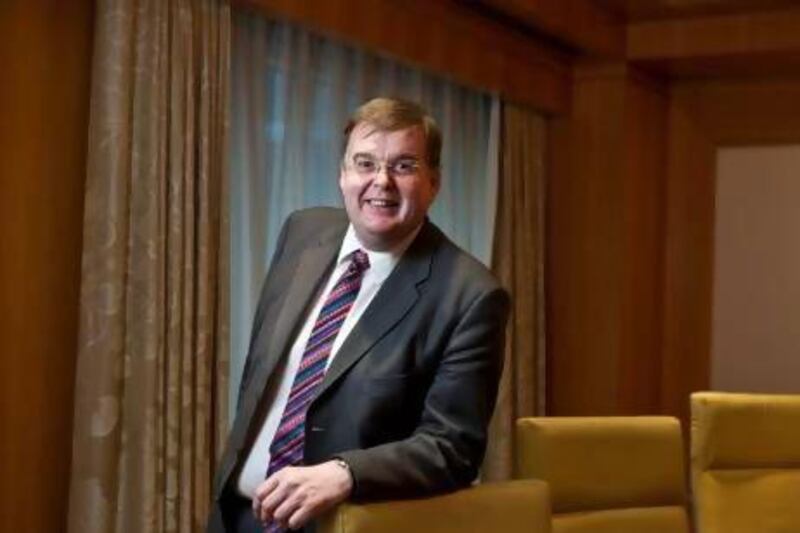Selling traditional insurance in the Middle East has been a famously problematic business. There are socio-cultural difficulties on top of the usual barriers to entry in an industry dominated globally by big American and European players.
Life insurance and even buildings and property insurance have remained an under-exploited market in the region; demand has remained weak by international standards, and market penetration low.
So it is just as well that Nathan Parnaby, who recently launched the Arabian Gulf business of Standard Life with an office in the Dubai International Financial Centre (DIFC), stresses that his company is "less a risk-taking insurer, more a savings and investment company".
This makes Standard's new business here part of the wealth management industry, and this is something the region, with high standards of living and energy revenue-backed capital, understands well.
Mr Parnaby, who is the chief executive of Standard's Asia and emerging markets business, did his homework well before the Dubai launch. He is targeting three very distinct segments: expatriate Europeans, non-resident Indians and "affluent, internationally mobile individuals", which just about mops up all the rest, including any UAE nationals who might need the services of a wealth manager.
The appeal to Europeans, especially the British, is easy to understand: Standard Life is one of the biggest UK insurers, with a trusted brand backed by a nearly 190-year heritage. It is familiar to most British expats in the Gulf.
The appeal to Indians living and working in the UAE and wider Gulf region is an extension of a strategy that has been the main line of global expansion for Standard over the past decade.
It is already big in India, via a joint venture with the huge Indian business Housing Development Finance Corporation, which claims to be the country's biggest mortgage provider (although mortgages in the UAE will not be one of Standard's lines), and is hoping its reputation there will encourage Indians in Dubai to do business with it here.
An alliance with a big local company is also a feature of Standard's operation in China, where it has a joint venture with an insurer ultimately owned by the government of the province of Tianjin.
But the business in Dubai will more closely follow the pattern established in Hong Kong and Singapore, two big centres for Standard.
"Our core strength if that we understand how to run the business with local partners, whether they are independent financial advisers or brokers," says Mr Parnaby.
The independent financial advisers profession in the region has not been above criticism: with no system of licensing and very light-touch regulation, there have been calls for tougher rules to govern the business.
Mr Parnaby has discussed this matter with the Dubai Financial Services Authority (DFSA), the regulator for the DIFC.
"Our experience with the DFSA has been very positive to date. They are focused on customer protection, which is encouraging. The regulator should look after the regulator, of course, but should also look after the interests of the industry.
"We believe the product has to be more transparent, and the regulator agrees. There has to be a framework within which distributors should operate," he adds.
Does this mean he is in favour of a comprehensive licensing system for independent financial advisers in Dubai or elsewhere in the UAE? "That's a matter for the regulator. We have a choice, and we are keen to do business with high-quality partners and want long-term relationships. We do not want purely transactional business," he says.
After looking at several other Gulf financial centres, Mr Parnaby quickly decided on Dubai. "It's already a big financial centre, it's growing, and there are already affluent people here. Wealth management is built around certain cities, like London, Singapore, Hong Kong and now Dubai."
Nor does he rule out a move into Sharia-compliant business. "We've given it some thought, but have no immediate plans beyond the three segments already identified," he says.
Standard's international business is run from the Irish capital, Dublin, and the 10 Standard employees in the new DIFC office will report to executives in Ireland and the head office in Edinburgh, Scotland.
Mr Parnaby, who describes himself as "of no fixed abode" because he spends so much time on business travel, says the opportunities in the Gulf region are "huge".
But it might be suggested that Standard has actually got into the market a little late. Most of the big international names in savings investment and wealth management are already in the region, in an increasingly competitive business.
Mr Parnaby ponders this suggestion: "Dubai is much more politically stable than anywhere else in the region, and the economic recovery is well under way.
"We hope to grow faster than Dubai. For us, it's exactly the right time to open up here, and we're more than capable of competing," he responds emphatically.
[ fkane@thenational.ae ]





